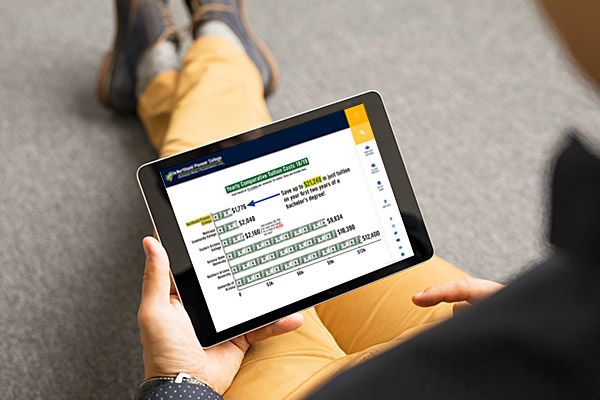Disability Testing: If you suspect you have a disability but are not sure, the Office of Accessibility and Inclusion recommends that you contact your primary healthcare provider for possible testing or referral for testing.
Parent Guide to NPC assistance and accommodations
Every student registered with the Office of Accessibility and Inclusion (OAI) has the responsibility to meet the same academic and student conduct standards as other students and ask for assistance and accommodations in an appropriate manner.
Learn what you can do as parent >
-
Federal Laws: The laws that govern universities are Section 504 of the Rehabilitation Act of 1973 and the Americans with Disabilities Act of 1990 (ADA). These federal laws charge colleges and universities to provide equal access and opportunity. This is different from high school as those laws focus on guaranteed success for the student.
-
Documentation: During high school the school provided the documentation for the student's disability, in college, it is the student's responsibility to pay for and supply their documentation. This documentation must be completed by a qualified professional and must include the functional limitations and demonstrated need of the reported disabilities.
-
Advocacy: In high school, parents often advocate for their children, in college the student is responsible for advocating for her or himself. This means that students must self-identify to OAI in order to get accommodations and request assistance when it is needed.
-
Instruction: In high school, modification to the curriculum and/or the pace of the courses can be applied for students with disabilities; however, in college, fundamental elements of the course cannot be altered. Accommodations are in place to provide students with equal opportunity or to reduce barriers without altering a course.
-
Confidentiality: In high school, parents can access any educational record for their student because they are their legal guardians. In college, the student is a legal adult regardless of their age and must provide written consent to allow the college or university to discuss his or her records.
-
Registration for Services: Students are encouraged to contact the Office of Accessibility and Inclusion by completing Step 1 of the OAI Process “Contact for Services”. This online form can be found on the OAI webpage www.npc.edu/oai. Once we have this form the student is contacted to schedule and Intake appointment which can be scheduled in-person or virtually. This appointment is an interactive/collaborative discussion to assess the impact of the reported disabilities to determine reasonable accommodations for equal access. All information discussed and shared with OAI kept confidential and will be used to plan for appropriate support and accommodations.
Accommodations are determined on a case-by-case basis. The Office of Accessibility and Inclusion may or may not request third-party documentation. This documentation would represent the current concerns of the student and often assists both the student and OAI in determining appropriate accommodations. -
Accommodations: Each semester, students must request their accommodations to ensure reasonable, appropriate, and timely accommodations are in place for each subsequent semester, this can be done by completing Step 3 of the OAI Process, the link to that form can be found on the OAI webpage: www.npc.edu/oai. If there is a need to discuss accommodation-related concerns the student must contact OAI and schedule a “Check-In” appointment by emailing oai@npc.edu or calling 928-536-6246.
Please prepare early so that our staff have time to provide appropriate accommodations.
Please note: the Office of Accessibility and Inclusion sends Accommodation Notification letters via email the primary recipient is the instructor, and students are copied to the email. It is the student’s responsibility to discuss the implementation of their accommodations with their instructors. -
How You Can Help Your Child to be a Self-Advocate: Children going off to college can be a stressful experience for any parent, but having a child who has a disability attend college can be more challenging. During this important transition, there are some things a parent can do to support their child’s ability to self-advocate. This includes:
- Knowing what their disability is
- Knowing how their disability affects them
- Knowing how their disability affects their school work
- Knowing how their disability affects them outside of school
- Recognizing what they need from others
- Anticipating areas of difficulty
- Addressing what they want others to know about their disability
- Effectively utilizing support services
**KEY: Encourage your student to reach out to their instructors for support when needed.
ReadWrite Software
Read & Write Software for NPC students
This software is provided to NPC students free of charge. This tool offers support when there are concerns related to reading and writing assignments: reading text out loud, understanding unfamiliar words, researching assignments, and proofing written work.
Download the trial version to get the installer for the Read&Write software (Windows or Mac).
Directions:
- Scroll down to and click the "Choose Your Platform" button, select the type of device or computer you will use, then click the "Install" button.
- Follow the instructions and select "United States" as the region in the dropdown menu.
- Once the Read&Write software is installed, you can sign in with your NPC student email addresses. This will switch your account from the trial version to a "premium user" on that device.
- Domain for NPC: npc.edu. The following link will get you to the ReadWrite homepage: https://www.texthelp.com/products/read-and-write-education/
Service Animals
Learn about Service Animal Support at NPC >
Per Americans with Disabilities Act (ADA)
Service animals are working animals, not pets. The work or task a dog has been trained to provide must be directly related to the person's disability. Dogs whose sole function is to provide comfort or emotional support do not qualify as service animals under the ADA.
If you are unsure, you are allowed to ask only two questions:
- Is the dog a service animal required because of a disability?
- What work or task has the dog been trained to perform?
For additional information about service animals and the ADA, please refer to the https://www.ada.gov/service_animals_2010.htm
Important information about service animals
Students with service/psychiatric service animals are not required to meet with the Office of Accessibility and Inclusion to register or approve their presence on campus, as these animals are allowed and protected under the Americans with Disabilities Act (ADA). Please note the differences between a service/psychiatric service animal and a support/therapy/comfort/emotional support animal. Service animals are allowed on campus, while support/therapy/comfort/emotional support animals are not.
- Service animals are for ONE individual only. They are trained to service their owner.
- Service animals are extremely well behaved and vigilant about their service to their owner.
- Service animals are not required to wear a vest that labels them as a service animal.
- Service animals are not required to have certification documents (only for institutions with housing or dorms).
- Service animals are not required to have special identifications.
Requests to remove a service animal may be made if:
- The animal is not under the control of the owner (growling, snipping). Barking and growling are not tasks service animals are trained to do to protect their owners.
- The animal is not house trained
- The animal wonders around freely playing, barking, running, sniffing through bags, going up to other people, and those behaviors are not part of the trained tasks for the student. Keep in mind that service animals can be off-leashed ONLY IF tethering/leashing the dog hinders the dog from performing its trained task for the student.
Requests to remove a service animal may not be made if:
- A faculty member or a student who have a fear of dogs or do not like dogs. If this is a concern, please call the Office of Accessibility and Inclusion (928) 536-6246. We will moderate the situation and work on alternate solutions to ensure the provision of equal access.
- A faculty member or a student who are allergic to the animal. If this is a concern, please call the Office Accessibility and Inclusion (928) 536-6246. We will moderate.
Pregnant & Parenting Students
Under Title IX of the Education Amendments of 1972, pregnant and parenting students are not considered students with a disability. However, if there were to be a medical concern during the pregnancy that impacts activities of daily living the student would qualify for support from the Office of Accessibility and Inclusion. In this case, the student would complete Step 1 “Contact for Services” found on the OAI homepage www.npc.edu/oai to get things started.
- Pregnant and Parenting Student Regulations: Please refer to the Pregnant and Parenting Student Regulations booklet provided by the U.S. Department of Education for additional information.






